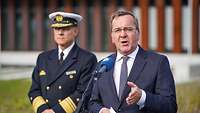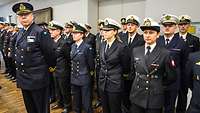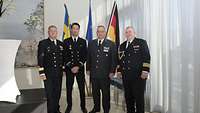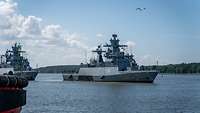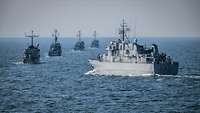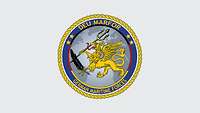Commander Task Force Baltic established
Commander Task Force Baltic established
- Date:
- Place:
- Rostock
- Reading time:
- 4 MIN
On 1 October, the German Navy took on a leadership role in the Baltic Sea region for NATONorth Atlantic Treaty Organization: Commander Task Force Baltic. The official inauguration ceremony took place on 21 October at the Navy Headquarters in Rostock - in the presence of Defence Minister Boris Pistorius and other high-ranking guests from home and abroad.
“The Baltic Sea is much more than just a waterway,” said Pistorius in his speech during the ceremony. It was a vital corridor for trade, military mobility and energy security, and a possible front line of collective defence against evolving threats. The minister emphasized: "The security of the Baltic region is inseparable from the security of all of Europe. The importance of the region has become even more evident against the background of the ongoing Russian aggression in our immediate neighbourhood."
The Commander Task Force Baltic staff, or CTFCommander Task Force Baltic for short, is ready to take on command tasks for the Alliance in the Baltic Sea. It coordinates naval activities in the region with Germany’s allies and provides them with a current joint maritime situational picture around the clock.
A visible expression of the Zeitenwende
The headquarters will play a crucial role in responding to regional challenges, said Pistorius. For him, this includes “the protection of NATONorth Atlantic Treaty Organization member states’ interests against aggressive actions, particularly given the proximity of Russia”. CTFCommander Task Force Baltic will play a key role in fostering cooperation between the allied navies in the Baltic Sea and enhancing their interoperability.
“Here and today Germany is once again showing that we take responsibility, our words are followed by concrete actions,” said Pistorius. He was also pleased “that the German Navy continues to work closely, side by side, with our partners”. CTFCommander Task Force Baltic has two main tasks: to plan maritime exercises and operations and to lead naval forces assigned by NATONorth Atlantic Treaty Organization in peace, crisis and war.
The staff is a national headquarters with multinational participation. It is initially led by a German admiral. The position of his deputy is initially filled by a Polish flag officer, the position of chief of staff by a Swedish staff officer. A rotation is planned after four years at the latest. The core of the personnel is provided by the national operations staff DEU MARFORGerman Maritime Forces, which has existed at the Germany Navy Headquarters in Rostock since 2019.
13 nations are participating, more are welcome
Vice Admiral Jan Christian Kaack, Germany’s Chief of Navy, thanked the nations that already provide personnel for CTFCommander Task Force Baltic. “The sheer number of nations involved, extending beyond the Baltic Sea states, is clear proof that security in the region affects the whole Alliance,” said Kaack, adding: “I would also like to thank those nations who did express an interest in joining but have yet to decide on their commitment. We are eagerly anticipating any contribution you would like to make to this.”
The staff can comprise up to 180 personnel in peacetime. In the event of a crisis or conflict, it can grow to up to 240. In addition to Germany, twelve other nations are currently contributing personnel to CTFCommander Task Force Baltic: Denmark, Estonia, Finland, France, Italy, Latvia, Lithuania, the Netherlands, Norway, Poland, Sweden and the United Kingdom. Personnel from these and other partner countries can already fill up to 60 multinational positions in the so-called Peacetime Establishment.
CTFCommander Task Force Baltic has a busy year ahead
“In the end, it is not ships that fight. It is people,” said Pistorius, expressing his appreciation for the commitment of all personnel. “That is why I want to recognize the work of and, more importantly, thank those men and women who have contributed to bringing the idea of this Commanders Task Force to life. And I want to thank those who serve here and in NATONorth Atlantic Treaty Organization. You embody the very spirit of our Alliance. Your professionalism and commitment are the foundation of our security,” said the Minister of Defence.
Finally, the German Chief of Navy took a look ahead. The Vice Admiral referred in particular to the full naval calendar for the Baltic Sea next year, including the high-value exercises BALTOPSBaltic Operations 2025 and Northern Coasts 2025. “Assuming this leadership responsibility in the Baltic Sea now means that the German Navy has to meet particularly high standards for the quality of our work,” said Kaack, “and this must be done 365 days a year and around the clock.”


